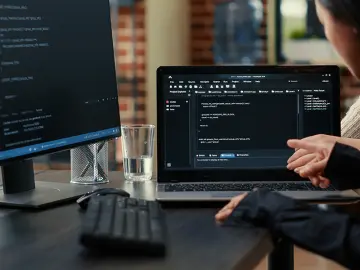Laravel 9 introduces Blade components for reusable UI elements, integrates Laravel Jetstream scaffolding library by default, enhances Livewire with Alpine.js integration and improved reactivity, improves Artisan console with new commands, focuses on performance optimizations, updates core packages for compatibility, enhances testing capabilities, and improves documentation. These features empower developers with modular UI development, streamlined setup, dynamic interfaces, faster execution, testing efficiency, and comprehensive resources for building modern web applications.
Laravel 9 new features:
Blade Components: Developers can create reusable UI components using Blade, promoting code reusability and modularity.
Laravel Jetstream Integration: Jetstream is now integrated by default, providing a scaffolded starting point for authentication, teams, API support, and more.
Livewire Enhancements: Livewire, used for building dynamic interfaces, receives updates including Alpine.js integration and improved reactivity.
Artisan Console Improvements: The command-line interface, Artisan, is enhanced with new commands and improved usability.
Performance Optimizations: Laravel 9 focuses on optimizing core features like query performance, memory consumption, and routing for faster execution.
Package Updates: Core packages like PHPUnit, Blade, and Symfony components are updated for compatibility with the latest versions.
Testing Capabilities: Laravel 9 introduces new testing helpers, assertions, and workflows to streamline the testing process.
Improved Documentation: The documentation is enhanced with comprehensive explanations, additional guides, and improved examples.
These new features empower developers with enhanced UI development, streamlined setup, dynamic interfaces, improved performance, efficient testing, and comprehensive resources for building modern web applications.
What We Expect With Laravel 9:
With the release of Laravel 9, developers can expect a range of exciting enhancements and new features. Firstly, Blade components will revolutionize UI development by enabling the creation of reusable UI elements, promoting code reusability and modularity. The integration of Laravel Jetstream as the default scaffolding library will streamline application setup, providing authentication, teams, API support, and more out of the box.
Livewire, an already powerful library, will receive significant improvements, including Alpine.js integration and enhanced reactivity, making it even easier to build dynamic interfaces. The Artisan console will offer better usability with new and enhanced commands, simplifying common development tasks and enhancing the developer workflow.
Laravel 9 will prioritize performance optimizations, aiming to improve query performance, reduce memory consumption, and speed up routing. These optimizations will contribute to faster application execution and a more efficient development experience.
Overall, Laravel 9 promises an enriched development experience with its new features and improvements, empowering developers to build scalable, performant, and maintainable web applications.
Laravel 9 requirements:
The specific requirements for Laravel 9 have not been officially released yet since Laravel 9 has not been launched. However, based on the previous version’s requirements, it is expected that Laravel 9 would have similar requirements. Typically, Laravel applications require the following:
PHP: Laravel typically requires PHP version 7.4 or higher. It is recommended to use the latest stable version of PHP for better performance and security.
Web Server: Laravel can be run on various web servers like Apache, Nginx, or Microsoft IIS. The specific configuration may vary depending on the chosen web server.
Database: Laravel supports multiple databases, including MySQL, PostgreSQL, SQLite, and SQL Server. You will need a compatible database server to store your application’s data.
Composer: Laravel uses Composer, a dependency management tool for PHP, to manage its dependencies and packages. Ensure that Composer is installed on your system.
Additional PHP Extensions: Laravel may require certain PHP extensions like OpenSSL, PDO, Mbstring, Tokenizer, XML, and others. These extensions are typically enabled by default in most PHP installations.
It is important to note that these requirements are based on previous versions of Laravel, and the actual requirements for Laravel 9 may differ. It is recommended to refer to the official Laravel documentation or check the Laravel website for the updated and accurate requirements once Laravel 9 is officially released.
Laravel 10 release date:
Laravel 10 was scheduled to be officially released on February 7, 2023, following the introduction of Laravel 9 on February 8, 2022. But because the team needed more time to finish their work, Laravel 10 wasn’t made available until February 14, 2023.
Conclusion- Laravel 9 brings a host of new features and enhancements, including Blade components, Jetstream integration, Livewire improvements, performance optimizations, and more. With its elegant syntax, comprehensive features, and active community support, Laravel continues to be a top choice for efficient and scalable web application development.

Leave a Reply